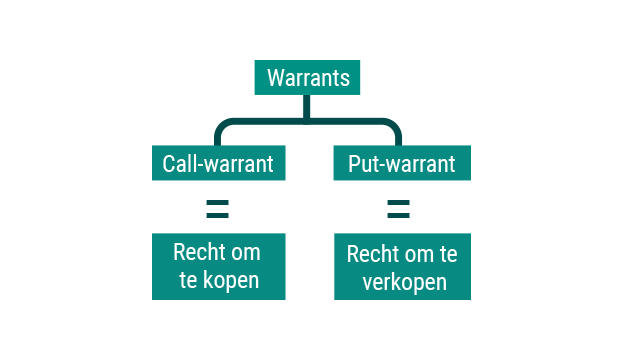Warrants – Investors' Academy
What is a warrant?
Buying warrants is very similar to buying options. The big difference to options, however, is that an option is a standard contract whereas a warrant is a customised contract. As with options, warrants work using leverage: with a relatively small amount, you can earn a lot or run the risk of losing a lot.
You should therefore first read the Investors' Academy page about buying options.
What rights do you buy through a warrant?
If you buy a warrant, you are entitled to buy (call warrant) or sell (put warrant) a predetermined quantity of an underlying asset at a predetermined price during the exercise period. For most warrants, the underlying asset is a number of shares, but it can also consist of currencies or commodities, for example.
What you need to know about warrants
In order to trade successfully in warrants, it's important to be aware of the characteristics of this complex investment product:
Differences to options
- Options are issued via the options exchange. Warrants are issued directly by companies and financial institutions. Buying and selling warrants is therefore carried out in the same way as shares. No additional agreement is required for this.
- Warrants are customised contracts and are harder to trade than shares or standard option contracts.
- The issuer of the warrant determines the contract volume, the exercise price and the term. For options, the contract volume is the same for all options. For share options, for example, the volume is 100 shares as standard.
- In the case of warrants, there is only one exercise price and one term. In the case of options, there are a different series of options for each underlying asset, with different exercise prices and terms. The options exchange regularly issues new options series, provided the underlying assets meet certain conditions.
- You can only buy warrants, not write them. You can both buy and write options.
- The term of a warrant is generally longer than that of options, with the term usually being several years.
You've bought a warrant. What happens now?
For options and warrants, it is important to look at the price of the underlying asset:
- What if you buy a call warrant and the price of the underlying asset rises above the exercise price? In that case, it may be attractive for you to exercise your warrant and purchase the underlying asset at the exercise price. Alternatively, if you do not want the shares, you can sell the warrant at a profit.
- What if you buy a put warrant and the price of the underlying asset falls below the exercise price? In that case, it may be attractive for you to exercise your warrant and deliver the underlying asset at the exercise price. Of course, you can only do this if you actually have the underlying asset in your investment portfolio. If you don't hold the underlying asset, you can sell the warrant at a profit.
- If the price of the underlying asset doesn't do what you expected and it doesn't go anywhere near the underlying asset, your warrant will expire with no value on maturity. You may therefore lose your entire investment in the warrant, which is your maximum loss. Of course, you can also try to sell your warrant earlier during the exercise period in order to limit the loss. In this case, if you sell the warrant before the maturity date, you will have less of a loss than if the warrant expires with no value.

Watch the leverage
Warrants also work using leverage. Leverage means that the profit you can make is higher than the profit you would be able to make if you were to invest directly in the underlying asset. This is because you need to invest only a small amount, although your chances of profit remain the same. The leverage therefore gives you a greater benefit from a price movement in the underlying asset than if you were to invest in it directly.
On the other hand, if the price of the underlying asset moves the wrong way for you, you will also lose more than if you invested directly in the underlying asset.
Investing in warrants is risky, and you can lose your entire investment.
For a recent overview of our standard costs and taxes, please consult our list of charges.
Investing with ABN AMRO MeesPierson Belgium
Discretionary Portfolio Management

Your portfolio manager guides you through every choice you make.
- A team of experienced experts invests for you
- You can choose from several mandates that match your wishes and goals
Investment Advice

You build your investment portfolio together with your investment adviser.
- Your investment adviser acts as your partner, but you make your own decisions
- You can choose from several concepts that match your wishes and goals
Self directed investing

You would like to decide on your own in what you invest.
- You make your own investment choices
- You choose from shares, investment funds, ETFs and complex products